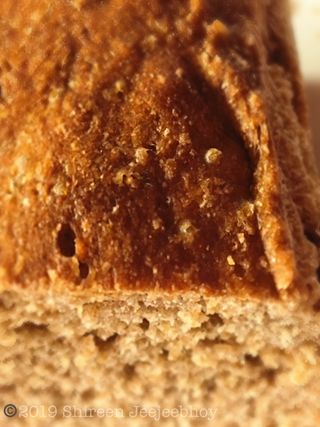Grief
Baking Resurrection
What does it take to try baking bread again after being abandoned?
Posted February 4, 2019

It was the blue Easy Bake Oven that introduced me to the heroin of baking. It set me on a course of experimenting with vanilla-scented cakes, chocolate-oozing brownies, chocolate-chip cookies chewy with peanut butter and dotted with fragrant toasted pecans. I was eight years old when I began. I don’t recall how old I was when I baked my first loaf of bread.
Illnesses, injuries, low blood pressure that pulled me to the floor didn’t stop me from diving into recipe books or dreaming up my own creations. I ploughed through health obstacles to create sweet things for others to eat. Each kind of baking infused its own pleasure into my soul. From bread, pleasure rose out of the scent of yeast mixing with honeyed milk, the miraculous sight of flour and water and butter coming together into a malleable mass, the kneading and feeling the dough giving way to the heel of my hand and becoming smooth and pliable. Fatigue and muscle weakness caused me to turn to mixers and bread machines. As long as I could still adapt recipes to my imagination and share risen bread with others, I was happy. I didn’t stop baking until years after my brain injury when most people had abandoned me. For, you see, at its core baking is about creating for another. Or, better, many others.
Right after my brain injury, I began this puzzling habit of creating bread that was raw in the middle and being unable to finish making brownies, cookies, and cakes. I had help for a little while, though no one could help me figure out why my decades-old habit of rapping on the bottom of loaves to determine if they were done no longer worked. Still, the bread machine came to my rescue, and when I craved rolls, which a bread machine can’t bake, I tried to set timers and follow recipes precisely and not listen to my brain panting, “take it out,” “take it out,” “now, now, now!” After many years of persevering and encouragement, I succeeded technically, but by then the number of people I was baking for had plummeted.
Who was I baking for?
Me and a couple of others. When they who still looked forward to my baking up and left the city, I stopped.
Pushing through the fatigue; pacing myself to try and keep my energy going; strategizing baking around tasks I had to have energy for; being okay with transcribing recipes onto Post-It notes which I tacked up in a row for me to follow methodically; not knowing what to do with all the baked goods other than let them pile up in my freezer; hearing the same excuses as to why people couldn't eat my cookies after I'd regained my ability to bake them; not happy with weight gain from my injury; the expense as food prices exploded and my income dropped — all of that became intolerable. When you’re baking for others, you can find ways around those obstacles. I lost my spirit to try anymore.
That was a few years ago.
Only once, early this winter, did anyone say anything to me about me no longer baking. A health care professional suddenly began talking about baking muffins and there’s a recipe they could send me and I should try it. I shook my head. That was it.
A talent, a skill, a joy that was a core to my identity gone, and none noticed or cared enough to listen and persevere through my despair to figure out how to get it back.
As my reading comprehension retraining drew to an end and temperatures began to fall in late 2018, I thought about baking bread again. Maybe this new trend of men on social media and on radio sharing their bread baking exploits had stirred up memories of bread dough filling my hands with joy. Perhaps those memories had transformed my frustration with trying to find a decent loaf of bread into thoughts of making my own again. Worsening my frustration was that loaves and bags of rolls are made for a family. They’re too big even for a couple — if you really want to eat fresh bread as opposed to fresh then increasingly stale bread. I asked one bakery if they could consider making smaller loaves. Nope!
Okay then.
Skepticism greeted me from the one I was with when I picked up Cook’s Illustrated All-Time Best Bread Recipes 2018 last Fall. Your yeast is old, they said baldly.
The magazine sat on my shelf unlooked at. The skeptic was right. I talked no more about baking bread to anyone, including my health care professionals.
Where does resilience lie? Does it lie in the silent recesses of your head as your conscious mind grieves and yearns? Does it lie in not talking so as not to hear all the reasons why you can’t or over-the-top encouragement that paradoxically makes you feel pushed into trying? I know that my neurons have healed a lot since the last time I baked anything. I believe that no matter how much you want something, that when you have a brain injury, you must have health care providers willing to provide effective treatment to resurrect the cognitive foundations of your pre-injury talents and skills. I also know grief can stop you cold. Resilience begins with support that recognizes the necessity of healing the injury and the grief. And when that’s not enough, sometimes it begins with a prayer to God, asking for the spiritual power to bake a loaf of bread.
This early February 2019 Sunday morning, I pulled out the magazine. I flipped through it, looking for a doable recipe. Nothing appealed. I shelved it. I prayed. No power urged me on; the years-long despair of, “Is it worth baking for one?” stalled me. Several hours later, I was watching Cook’s Country, pining for bread, fed up with seeing yet another meat recipe, when suddenly I was walking into my kitchen, retrieving the magazine, flipping the pages, spotting the very-easy-to-make English Muffin Bread, whatever that was, and checking my yeast. It had sat in my fridge for . . . uh . . . four . . . maybe five years. I ran my water, testing its heat with my pinky finger as if I had never stopped baking. I filled a small container with warm water as grief at my lost art and lost people rose into my eyes. I dropped a pinch of sugar into the water. I spooned a little yeast into the sweetened water and stirred. Then I set a timer for five minutes and ignored the yeast until I heard the timer ding.
The yeast had bubbled.
A freaking miracle.
Pretty soon, I was measuring years-old organic stone-ground whole-wheat flour that had been buried in my fridge into a large bowl set on my scale. Although I was far more methodical than I had been before my brain injury, with setting out my implements and ingredients, and checking the recipe over and over, it was like all my old skills were waiting for me to use them again. I automatically knew it’s better to weigh flour than measure it by volume. I also sensed how much more yeast I should add with using whole-wheat flour instead of the called-for white bread flour. The moment I poured hot milk onto the dry ingredients, the intoxicating scent of bread dough rose and hit all my olfactory cells, sending signals of joy that dried my tears and closed my eyes in ecstasy. No wonder men have taken up bread baking.
The resultant loaf was not a brick.
I don’t know if I can bake again. I barely touched the grief from losing my talent and skills for all those years and for then being abandoned. Worse than losing my bread baking was losing people who wanted me to bake their birthday cakes, a ritual I'd begun when I was barely ten years old. Yet my desire to modify recipes to feed one or two fresh bread without it growing mould before one can finish it, remains. I desire to see if my ideas to make this whole-wheat version of English Muffin Bread airier will work. I haven’t told anyone because I don’t want to talk about it. The pain is real. So I write about it instead, to see how I feel, to see if this step in the endless brain-injury recovery journey is a blip or the first of many down a new path.
Copyright ©2019 Shireen Anne Jeejeebhoy. May not be reprinted or reposted without permission.




